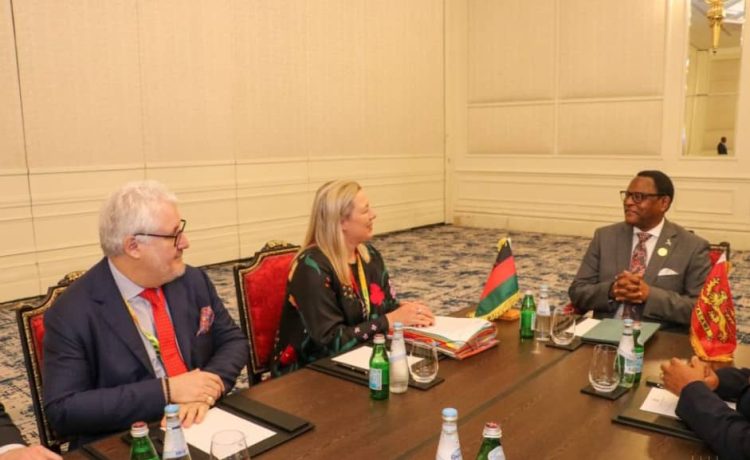During his trip to Doha, Qatar in October this year, President Lazarus Chakwera engaged in fruitful bilateral discussions with the European Union delegation, laying the groundwork for the potential resumption of direct budgetary support to Malawi.
The talks were held on the sidelines of the 5th summit of the Least Developed Countries (LDCs) and focused on restoring essential financial assistance that has been absent for over a decade.
The discussions included a review of Malawi’s progress in implementing governance reforms and enhancing public financial management systems, which were declared crucial for ensuring effective use of the EU’s financial assistance.
The President’s efforts have today produced the anticipated fruit, as EU announces its resumption of budget support to Malawi, marking an important milestone after a decade-long absence.
This significant development, announced on Wednesday, includes a substantial allocation of €55 million (approximately K107.9 billion), with €50 million designated for direct budget support over a 30-month period, primarily focused on enhancing the country’s secondary education sector.
The EU’s decision to reinstate budget support signals a remarkable turnaround in international relations and a renewed confidence in Chakwera’s administration.
After years of strained ties due to governance issues and fiscal mismanagement, this financial backing represents a restoration of trust and a commitment to collaborative development. EU Ambassador Rune Skinnebach noted that the funding is a clear endorsement of the government’s reform agenda.
The initiative is set to improve the efficiency and effectiveness of Malawi’s secondary education services, which are vital for the nation’s long-term development. By combining sector-specific support with wider public financial management reforms, the program aims to establish a more robust educational framework capable of driving economic growth.
“Education is essential for national development,” emphasized Skinnebach. The EU’s involvement aims to tackle longstanding issues such as inadequate infrastructure, insufficient teacher training, and resource allocation shortfalls. The first tranche of €20 million is expected to be disbursed before year-end, providing immediate resources necessary for implementing critical reforms.
President Chakwera’s leadership has focused on transparency, accountability, and reform in public service. His administration has prioritized rebuilding international partnerships and restoring Malawi’s credibility on the global stage. The resumption of EU support not only validates these efforts but also provides Chakwera with an opportunity to demonstrate tangible outcomes from his governance strategies.
Political analysts view this achievement as a pivotal moment that may enhance Chakwera’s standing both at home and abroad. By securing essential funding, he reinforces his image as a capable leader committed to reshaping Malawi’s socio-economic landscape.
However, challenges remain on the horizon. The successful implementation of the budget support will hinge on the government’s ability to tackle issues like corruption, enhance public service efficiency, and address ongoing economic pressures, including rising inflation and currency fluctuations. Close scrutiny from local and international observers will ensure that stakeholders demand transparency in the allocation and use of these funds.
As the country gears up to implement the educational reforms funded by the EU, it must simultaneously focus on urgent issues such as ensuring access to quality education and equitable resource distribution among its citizens.
President Chakwera’s successful negotiations for EU budget support marks a critical juncture in Malawi’s quest for sustainable development. It reflects a renewed commitment to reform and the potential for significant advancements in critical sectors. As the nation progresses, the emphasis will be on effective utilization of this support while maintaining momentum for future partnerships that can propel Malawi toward its long-term development goals.
This landmark achievement has set a promising path for President Chakwera’s administration, reinforcing the notion that improved governance and international cooperation can lead to meaningful progress for the Malawian people.













